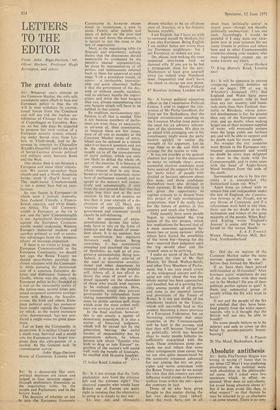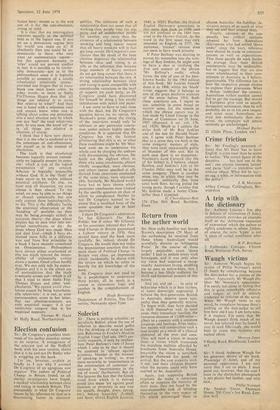Absolute antithesis
Sir: Stella FitzThomas Hagan was wrong in saying (5 June) that in my letter (22 May) I was confusing absolutism in the political sense with absolutism in the philosophi- cal sense. All I asked were two questions which, in effect, re- quested 'How does an anti-absolu- tist avoid being absolute about it? but if he does avoid this then, in what respect?' so that therein he may be referred to as an absolutist —in some respect. There is no con-
fusion here: except as to the way out of it for the anti-absolutist, strong or mild.
It is clear that my interrogation
operates equally in the political field as in the logical one. If you set up a democratic regime how far would you insist on it? If absolutely then you could be un- democratic to those who may want an undemocratic regime— but this apparent harmony in `titles' would not prevent conflict in fact. It is possible to be intoler- ably democratic—just as in the philosophical sense it is logically possible to conceive of a totally (absolutely) relativistic system: provided one forgets that to know black one must know while. In other words, to insist as Stella
FitzThomas Hagan does that 'all
things are relative' is to invite 'But relative to what?' And then one is faced with a reference yoid and cannot know what one is
talking about unless one postulates also a total absolute pole by which one can 'feel' the total relativistic pole. In any case, the word 'all' as in 'all things are relative' is absolute, of course.
I think that I have now shown that it is she who is confused as to the inferences of anti-absolutism, not myself as to the concept of absolutism.
The truth is that absolutism becomes logically present immedi- ately we logically present its oppo- site: which is true of the logical presentation of any concept. Atheism is logically impossible without God. It is the 'fault' of logic never to be usable without potential antithesis. Or else, we must stop all discussion, yet even silence is then absurd. To my mind, we may he able to see things as though unilaterally but can only express them heterologically, or die. This is the difficulty facing the empirical observation or the 'handling of particles (as they may be being .wrongly called) in Quantum theory—the place where physics has to pass over into em- pirical metaphysics, or die: the place where God was made Man and died God—which I have ex- plained more fully in a different way and from first principles in a book I have recently completed on Omnipotence. Philosophers have always either overlooked or else too much ignored the impos- sibility of unilaterally writing down a system. Good artists hardly ever. We can only talk by contra- dictions and it is in the adroit use of contradiction that the truth eventually comes out—which is all that I tried to show Stella Fitz- Thomas Hagan and other 'anti- hsolutists.' We cannot avoid abso- lutism except by being hypothetic- ally relativistic: it is not, as your correspondent avers in her letter, that our absolute-concepts are only empirical usages; it is our relativistic imagery that is for empirical necessity.



































 Previous page
Previous page